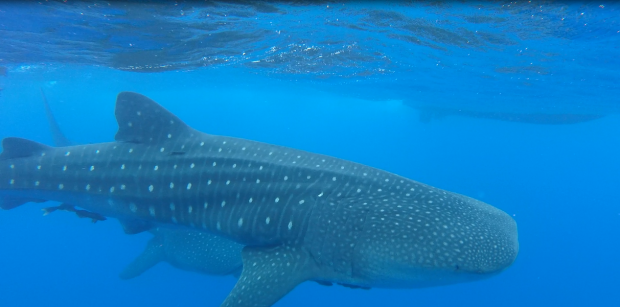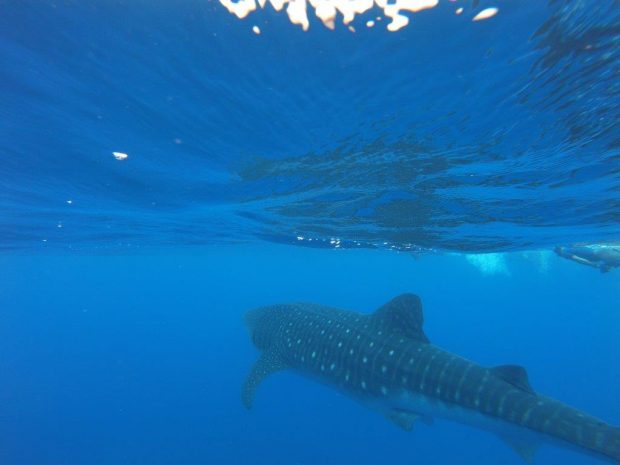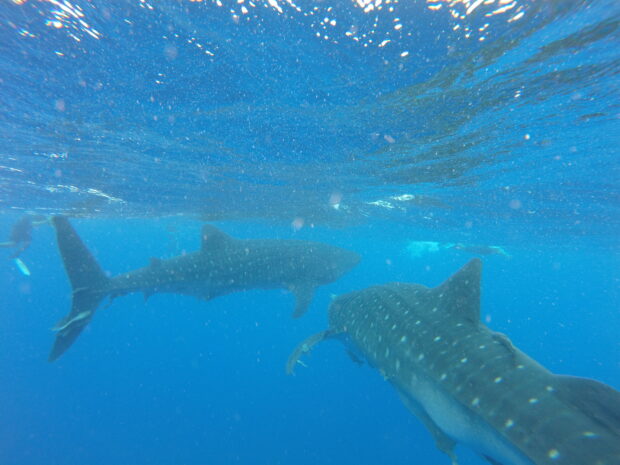Whale sharks are the world’s largest living fish, growing up to 18 metres in length! Sadly, due to a combination of factors, these majestic animals are now internationally classified as “Endangered” on the IUCN Red List. Whale sharks are found in the waters around St Helena usually from November until at least April each year. However, January and February are particularly important for these animals, as research suggests that, around this time, the waters around St Helena act as breeding areas for these creatures. Unusually, the St Helena population is comprised of equal numbers of males and females. All of this means it is vitally important to protect the whale sharks around St Helena.

Responsible whale shark tourism
The regular occurrence of whale sharks around St Helena also provides the perfect opportunity for members of the local community and visitors to swim and snorkel with these amazing creatures. St Helena has been described by experts as having the best whale shark encounters in the world. Tourism is one of the main growth areas on the island and whale shark tours can provide real economic benefit to the island.
Tourism can also cause disturbance to marine animals such as whale sharks and the St Helena Government has taken a precautionary approach to ensure that this does not happen. They developed best practice guidelines which include rules on approach distances, total number of people allowed in the water and total interaction time and it is strictly prohibited to deliberately touch or ride a whale shark. Operators who wish to take visitors to interact with whale sharks also need to undertake training as part of the Marine Tour Operator Environmental Accreditation Scheme.

Blue Belt support
St. Helena’s whale sharks have long been protected by their isolation in the islands waters. However, it is expected that the island’s new airport and improved tourism infrastructure will result in an increase in marine tourists, because the pristine marine environment is a popular place to see this rare and decreasing species. The St Helena Government wants to ensure that the whale sharks are protected now and into the future and asked the Blue Belt Programme for our help.
Over the past year, we have been working with the St Helena Government to strengthen their environmental policy on interacting with marine wildlife including whale sharks. We have also provided recommendations on a formal licensing scheme and created provision for the development and legislation once policy is formalised. We have provided specific guidance so that there is legal provision for all marine tour operators to apply for a licence to take visitors to interact with the whale sharks, having first completed a training course and attaining Marine Accreditation. St Helena Government will also be able to place conditions on the licence to ensure that the activity does not cause any disturbance. This will limit the number of operators who can interact with whale sharks and will ensure that those that do so act responsibly.

Licence conditions should help to protect Whale Sharks
Anyone who does not operate within their licence conditions could then have their licence suspended or revoked or could be fined for more serious offences. Licence conditions would also require operators to provide information about whale shark sightings and behaviour which will help with long-term monitoring. It is hoped that this scheme will ensure long-term protection for the whale sharks within St Helena’s waters.